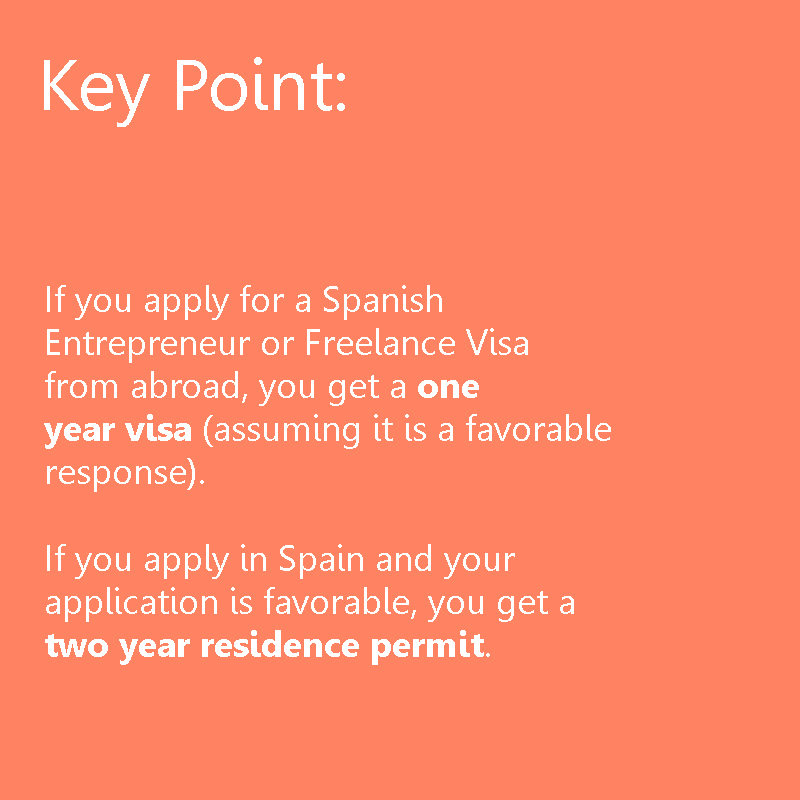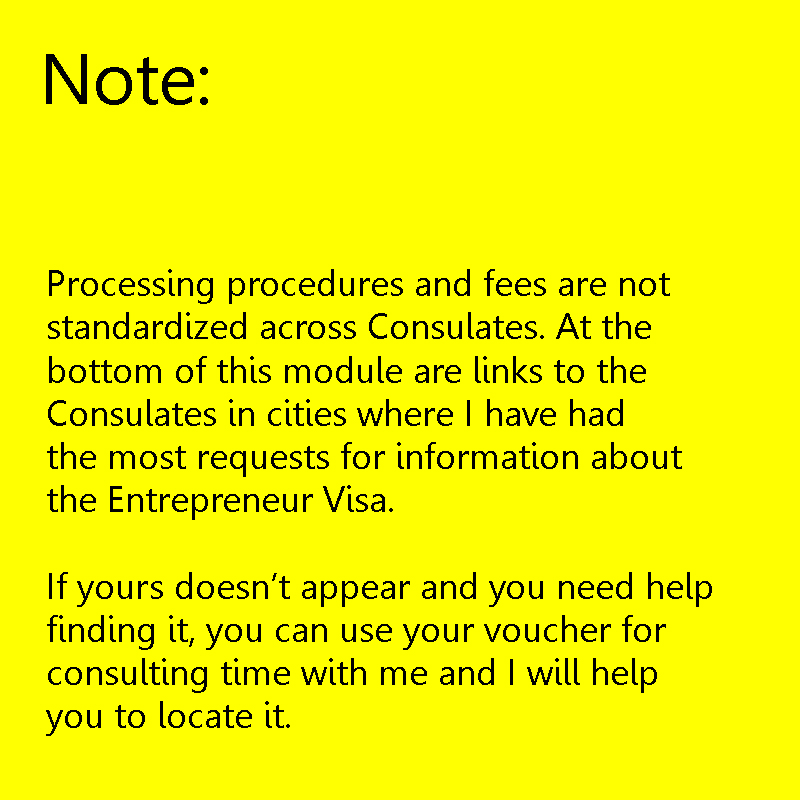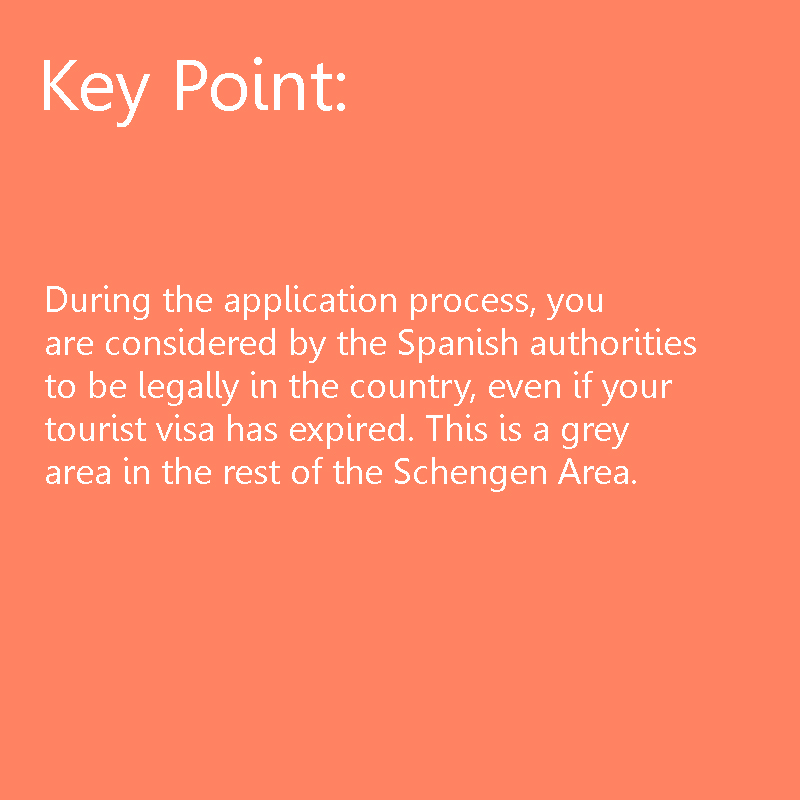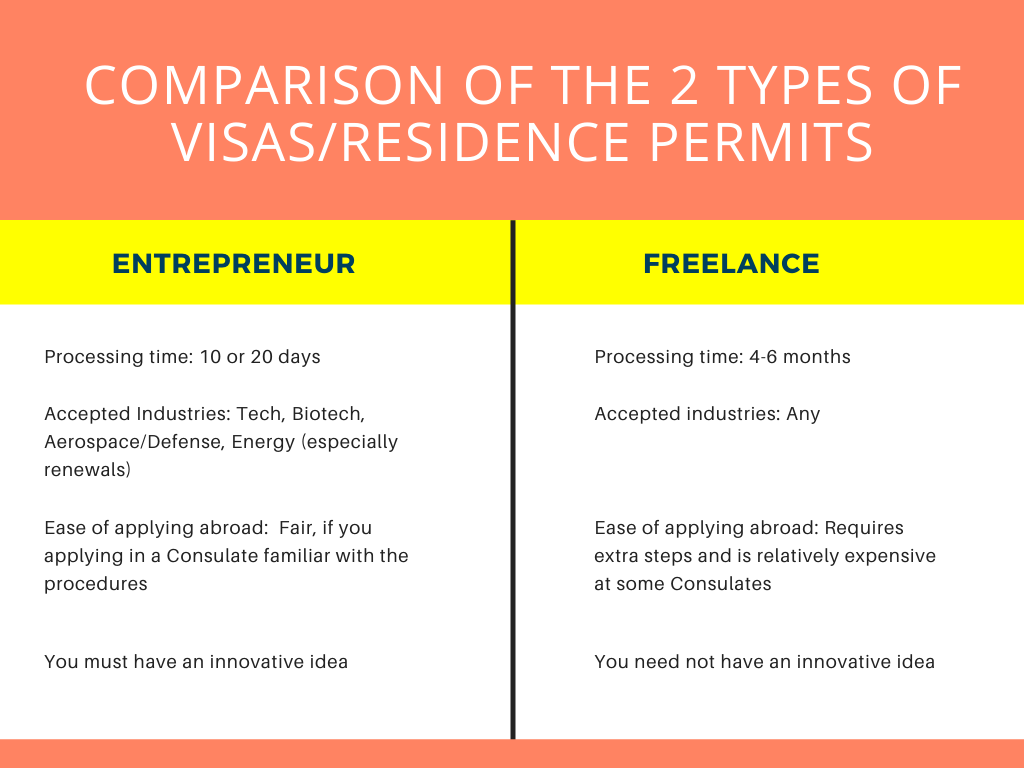M1- The Spanish Entrepreneur Visa vs. Spanish Freelance Visa & FAQS
This module covers the following points:
- The difference between the Spanish Entrepreneur Visa and Spanish Freelance Visa
- Where you apply for each visa
- Approximate processing times of each type of visa (or technically, residence permits if you apply in Spain)
- Thoughts on which visa is better for you, given your situation
- Answers to the most frequently asked questions I have received in the past five years
What’s the difference between an Entrepreneur Visa and a Freelance Visa?

Honestly, not that much. Both let you start your own business, both give you permission to work in Spain and both require you to write a business plan. There are three main differences:
1– The processing time for the Spanish Entrepreneur Visa is much faster. The Spanish immigration authorities are, at least theoretically, legally obliged to process a Spanish Entrepreneur Visa in 10 days and a residence permit in 20 days. If they don’t give you a result during this time, they have to approve your application. There are no legal requirements for the immigration authorities to process the Spanish Freelance Visa quickly.
“My experience with each: They did not meet the legal requirements to process my Entrepreneur residence permit approval in 20 days, but they did come close. They were only a couple days over, then they expedited the process. My Spanish Freelance Visa took them five months to process. The renewal of my Spanish Freelance Visa also took five months to process, then it was approved due to “administrative silence-” meaning they took too long. So there is some sort of legal time frame for processing the Freelance Visa but it is months, not days.
Working with others, I did see people that applied for the Entrepreneur Visa that did not receive a result for many months. I think they are now enforcing the time restraints more than they used to.”
2– The Spanish Freelance Visa (officially called Trabajo por cuenta propia, which means working for your own account) allows you to have your business plan approved by an independent agency before you submit your application. The benefit of this is they will give you feedback and advice. However, I am not sure if this option is available if you reside outside Spain. You would have to email them and ask as I don’t know anyone that has tried (more on this later in the course).
3– The Spanish Freelance Visa does not require your business idea to be innovative. Moreover, it does not require your business to create a significant number of jobs or to be strategic to the Spanish government. It also does not require it to be in an industry the Spanish government considers to be of strategic importance. These industries are: technology, aerospace, biotech, renewable energy and traditional energy.
Where to apply for an Entrepreneur Visa
There are two ways to get an Entrepreneur Visa. The first is to apply outside of Spain, at your local Spanish Consulate. The second way is to travel to Spain on a tourist visa and apply once you arrive in the country.
The difference between the two is this: If you apply outside Spain, if your application is approved the authorities give you a Spanish Entrepreneur Visa that entitles you to stay in the country for one year to launch your business venture. You do not get a identity card, which gives you the right to work. If you apply inside Spain, if your application is approved the authorities give you a two year residence permit. This does give you the right to work in Spain.

Should you apply inside or outside of Spain?
Personally, I applied inside Spain and was approved. I did this because I preferred to have the two year residence permit, as opposed to the one year visa.
“I have helped a number of other people apply for Spanish Entrepreneur Visas. In my experience, the success rate is higher for those that apply in-country. There is also the issue that, from what I have heard, a lot of Spanish Consulates do not know anything about the Spanish Entrepreneur Visa, let alone how to process applications. The exception I have seen to this is the Consulate in New York City. I know for a fact that they have processed at least one successful application and provided useful advice to another person that successfully applied.”
There are six major differences if you apply outside the country:
1– The process is done in two steps, as opposed to one step if you live in Spain. First, you get your business plan approved. If it is approved, then you apply for the visa. The business plan approval is the most important part. If that is approved, you will be granted your visa unless you have a criminal record, don’t have enough money to support yourself or don’t have health insurance.
2– The application form for the one year visa is different than the application form for a residence permit.
3– You will need to make an appointment at your local Consulate and apply in person (in Spain you apply digitally).
4– The process for paying the processing fee is different, and the fees themselves are different. For example, the Entrepreneur Visa is about $200 more expensive if you apply in the United States. The Freelance Visa is over $400 more expensive if you apply in the United States. On the other hand, if you apply in New Delhi, the fees for both visas are about 20€ cheaper than if you apply in Spain. If money is an issue, I recommend thoroughly researching the fees at your local Consulate, including the fees you may incur if Spain requires you to have a Schengen visa to enter. For example, if you live in South Africa, you will have to pay around 75€ just to enter the Schengen Area.
6– The amount of money you need to demonstrate you have to support yourself for the first year varies greatly across countries. For example, if you apply in South Africa, you have to demonstrate you have 2,130€ monthly for yourself and 532€ for every family member that is in your care. If you apply in Mexico, you have to demonstrate you have 537.84€ monthly for yourself and 268.92€ for every family member that is in your care.
A little insight into how the Spanish bureaucracy works
The Spanish bureaucracy is notoriously slow, particularly now (this course was created in August, 2020. It will be updated as the situation changes).
“To illustrate how slow it can be, my residence permit expired in November, 2019. I filed the paperwork necessary to renew it in late September, 2019. The process was simple: they sent me a form, I filled it out, paid the necessary tax and returned everything in a timely fashion. On April 20, 2020 they approved my application due to “Administrative Silence.” This means they didn’t get around to processing it so it was automatically approved. It took me a month to find the result because it was never delivered to me. The only notice I received was that there was a resolution to my application. I went into the digital system and they said I could download the result, but the system kept hanging up. I tried for almost a month to download it, but couldn’t. Eventually, I sent them a bunch of emails and finally they fixed it and I was able to download the approval letter. However, I still don’t have a new residence card. I have tried literally every single day to make an appointment to get my fingerprints taken and get a new card issued, but the system always says there are no appointments available and I should try again later.”
Key Takeaway
A lot of people I speak to (and I fell into this camp as well) worry that if it takes too long for the authorities to process their Entrepreneur Visa or Freelance Visa, they will overstay their tourist visas and be in an illegal situation. This is not the case, and the Spanish immigration authorities have recently clarified the situation.
During the application process you are considered to be in the country legally, even if your tourist visa expires. This is a grey area in the rest of the Schengen area, although I have never had a problem traveling in the Schengen Area, nor returning to Spain, whilst my visa (or renewal) was being processed.

There is also an added advantage in the current environment- as mentioned earlier, the Spanish bureaucracy is now slower than ever. It’s quite possible your application could get approved just because they take too long to process it.
Once you get approved, Spanish immigration authorities will also consider you to be in the country legally, even if you don’t have a residence card.
“I know this for a fact because I went to France earlier this month, traveling on my US passport. Due to covid-19, I can’t enter into Spain on a US passport right now. The border guard asked to see my Spanish residence card. I explained to him how it had expired nine months ago, but produced a copy of my approval letter and I was admitted back into the country, no questions asked, even though the letter was in Spanish, which the French border guard did not speak.”
Where to apply for a Freelance Visa
The Freelance Visa is the same as the Entrepreneur Visa. You can apply outside of Spain, at your local Spanish Consulate or you can travel to Spain on a tourist visa and apply once you arrive in the country.
Should you apply for a Spanish Freelance Visa inside Spain or abroad?
In my opinion, it is easier to apply in country.
You have an opportunity for a quasi government agency to review your plan if you apply in Spain
First, you need to write your business plan. You follow the same outline that you do if you are writing a business plan for a Spanish Entrepreneur Visa:
dax2013252351
Next, you can get your business plan approved by an independent, quasi-government agency. The good thing is they recommend changes you need to make before they make a final decision. I found that review helpful. If they give your plan a favorable review, you have a pretty good chance of getting your visa approved.
Once the business plan is approved, you submit everything digitally.
“When my residence permit expired, I was engaged in business activity very different than the business idea I laid forth in my original plan. I didn’t believe that digital marketing would be considered innovative by the Spanish government, so I renewed by residence permit as a Freelance Visa. I wrote a separate business plan and had it approved by UPTA. It turns out that they, and the immigration authorities, considered my digital marketing business to be of strategic importance to Spain, so I could have renewed my Entrepreneur Visa directly.”
Applying for a Spanish Freelance Visa abroad requires lots of extra steps and paperwork
If you apply abroad, you have to first make an appointment with your local Consulate. Then you assemble all of your documents and apply in person. You need more documents if you apply for a Freelance Visa outside of Spain, as opposed to if you apply in Spain. If your visa is approved, you have to go back and pick up your visa within 30 days. That is valid for 90 days.
Then, when you get to Spain, you have to go to the police station, bring your original documents and have your fingerprints taken to get your TIE (Tarjeta de Identificación de Extranjero). NOTE: This step is not required if you get an Entrepreneur Visa, because you do not need to get a TIE the first year.
Which is the best choice: Entrepreneur or Freelance Visa?
They are very similar. In my opinion, the Spanish Freelance Visa is lower risk that the Spanish Freelance Visa because it doesn’t require your business plan to be innovative. I wrote my Tech.eu blog five years ago, and since then literally hundreds of people have contacted me, asking for help. The truth is, I only know five people that have been approved for an Entrepreneur Visa: Me, a former Microsoft Millionaire that was pursuing a new business venture, his significant other, another New York tech entrepreneur that used to be Elon Musk’s roommate and some woman that applied for one back in 2014 and was featured in the New York Times. I know a lot of people who have had their applications denied, including some very wealthy people.

Here is my final recommendation. If you:
- Think you have an innovative idea
- Need to apply outside of Spain, or
- Live in Spain and need to travel a lot outside the Schengen Area,
Then you should apply for a Spanish Entrepreneur Visa. If it is denied, you can always reapply for a Freelance Visa.
If you don’t think your idea is innovative and don’t care about processing time, I recommend you go for the Spanish Freelance Visa.
FAQS
Q1: What is the minimum investment needed to get an Entrepreneur Visa?
A1: There is no minimum investment required in your new company. The idea of the Entrepreneur Visa is that it gives you time to establish your company- this includes securing outside funding, if necessary.
Q2: I read in the blog article that you wrote for Tech.eu that the process for getting a Spanish Entrepreneur Visa inside Spain is a two step process, even if you apply in Spain.
A2: At the time I wrote that article, it was a two step process. They have since streamlined it.
Q3: Did you use a lawyer?
A3: No. I tried a couple times but they were never very helpful.
Q4: Can you recommend a good lawyer?
A4: Sadly, no. I wish I could because here in Spain they all work on a referral basis. I have worked with a number of them, and they have all offered to pay me for leads, but I cannot in good conscience recommend a single one.
Q5: What is a gestor?
A5: Gestor translates to manager. Essentially, they are people that help you navigate the Spanish bureaucracy. Again, I can’t recommend a good one, which is telling.
Q6: Do the immigration authorities speak English?
A6: In Spain, don’t count on it. I have never known any of them to speak English. I am told that they do speak English at the Consulates.
Q7: What is a sworn, or official, translation?
A7: A translation that has been performed by a person the Spanish Government has approved to translate documents. All the Entrepreneur Visa application documents must be translated by a sworn translator and stamped. Translators will often charge higher rates for sworn translations.
Q8: What happens when my visa or residence permit expires?
A8: You renew it for another two years. When I renewed my Entrepreneur Visa, I had to reapply since I rolled it over as a Freelance Visa. When my Freelance Visa expired, they sent me an application in the mail that I filled out, paid the tax and submitted. At the time I had to submit it personally, but that only took about 20 minutes. To my knowledge everything is submitted digitally now. I will update this course when I learn more.
Q9: Can I bring my family members with me if I apply for an Entrepreneur Visa or Freelance Visa?
A9: Yes. You can bring legal dependents, your spouse and even your significant other.
Q10: Is there a difference in taxes and social security paid in Spain for the Entrepreneur Visa and Freelance Visa?
A10: No. The taxes and social security payments are the same, regardless of which visa you get.
